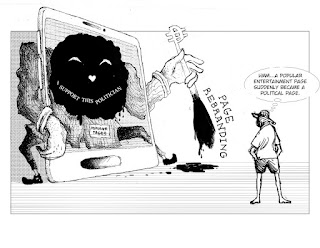COLUMN | A Sneak Peak of a Politician’s Fraud
By Junel F. Fiestada
What makes a branded product so expensive? Is it because of the manufacturing cost, the advertising strategy, or the material used? Frankly speaking, what makes them even expensive is the established name of the brand; be it they make bizarre products or astounding bags, the price still costs an arm and a leg. The same goes with rebranding celebrity fan pages – weaponized and controlled propagandas still looks gold even if they sound and appear to be foolish.
Have you ever received a notification saying "A Page you like changed its name"? Indeed, when all else fails, change the name of your page and endorse a candidate - easy money, right? Shortly after social media giant, Facebook removed dummy accounts of activists, journalists, senators, and other personalities spreading fake news and threats, a new political agenda arose as elections drew near. Pages renaming and rebranding their image have been surfacing on social media to support candidates running for the next national elections, posing a massive risk of spreading falsified and unconfirmed information.
However, even before the pandemic, in 2018, when the Duterte administration was starting to draw flak and under fire of criticisms, a page featuring South Korean actors had a change of heart and relaunched their page as ‘President Duterte Supporter’. It turns out the page’s administrator is a staunch supporter of President Duterte and an active member of pro-administration and pro-Marcos pages. Desperate times call for desperate actions - it must be scary; but when a desperate candidate calls a desperate influencer, expect a mess.
Furthermore, Camarines Sur official Luis Raymund “LRay” Villafuerte Jr.’s current Facebook page was created way back 2011, under the name of GMA celebrity Jake Vargas. Why would even a celebrity-intended page change its name for the sake of a politician? Money could be the driving force as to why political rebranding continues. High-caliber actresses Bea Alonzo, Angel Locsin, Maja Salvador, and Maris Racal’s fandom with large followings were targeted as well by an ‘unknown person’ offering a big amount of money to cede their platform. The buyer’s identity and intention were not clear but, one thing is clear as crystal, their shady plans cannot succeed against page managers who hold the line.
It is a no-brainer that people behind these political innuendos have an intention of gaining immense popularity in just a snap. Given that they already have wide coverage and followings, the dissemination of black propaganda wouldn’t be as hard compared to a Facebook page just starting to build its name with zero to no followers.
Cartoon by John Dave Poot
As users who follow pages on different platforms, we also have to have discernment for us not to be blinded by popularity. Not because a page is popular, it doesn’t mean their statements are correct. Popularity isn’t tantamount to truth, but being critical leads to reality. Social media always makes a big impact, may it be good or bad. But, users can also make a humongous impact – it is to side for the truth and not dwell on mere hearsay.
Published in 2018, the Newtown Tech4Dev Network wrote “While the Philippine public’s moral panic about fake news is often directed at high-profile digital influencers and celebrities such as Mocha Uson who are seen to incite political divisiveness and harass journalists, Ong and Cabañes argue that the real chief architects of disinformation are hiding in plain sight—wearing respectable faces as leaders in their industry while sidestepping accountability.”
Politicians buying known Facebook pages for the sake of popularity are just deceiving people who initially followed a page for their celebrity crushes and their ‘oppa’. Withal, when that politician sits on the throne of power and does fraud, don’t be so surprised; they already pre-empted their corrupt practices by buying a Facebook page to manipulate black propaganda.

